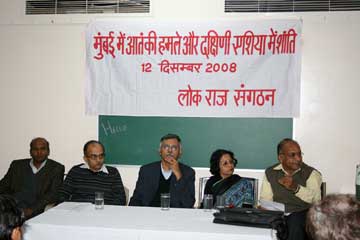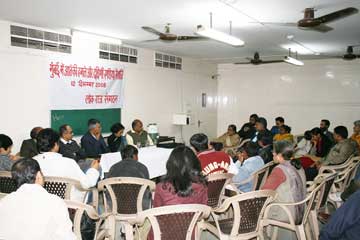
Archive 2009
|
December 16-31, 2008
Meeting to oppose war in South Asia
The meeting was organised by Lok Raj Sangathan on the theme "Mumbai terrorist attacks and peace in South Asia". Participants came from all walks of life — activists of political parties, trade unions, those working for the rights of people, those working for the political empowerment of the people. President of Lok Raj Sangathan, Shri S Raghavan, pointed out in his opening remarks that the Mumbai terror attacks have naturally evoked widespread anger amongst all sections of the people. People had been massacred in railway platforms, hospitals, the streets and in Five star hotels. There was naturally a great sense of insecurity amongst people, and lack of faith in the state's ability to protect their lives. Coming in the wake of numerous other terrorist attacks all over the country, it has raised questions about who are the guilty. Why have they never been punished? What is the source of this terrorism, and how to put an end to it once and for all? He pointed out that the genuine concerns of the people, the victims of terrorism, were being manipulated and misrepresented in the media and by the government. People's anxiety is being manipulated to step up the represstive state security apparatus, enact more fascist laws, and prepare for a war against Pakistan.
Prakash Rao said that terrorism has been the practice of capitalist imperialist states, directed to achieve internal policy objectives as well as international goals. While the US is the chieftain of organising terror, the states of India, Pakistan and other capitalist countries also practise this method. We must demand that India must take steps to dismantle the instruments of terrorism at home, demand the same of Pakistan, and work with Pakistan and other neighbours to break the tentacles of US imperialism in the region. We must foil the American plans to embroil our region in an imperialist war, which will be disastrous for our peoples, he concluded. Noted legal activist, Prashant Bhushan, pointed out that the strident calls for war against Pakistan would only increase the danger of terrorism in the region. Before the Iraqi occupation, or Afghan occupation, these two countries did not have incidents of terrorism. Now, in Iraq, not a day passes without suicide bombings killing so many. Pakistan has become a state embroiled in terrorism, and in Afghanistan, the US and NATO forces are acknowledging the failure of their 'war on terror'. A war against Pakistan, or even a "surgical strike against terror centers" would only magnify the danger of terrorism. He pointed out that the imperialist atrocities in Lebanon and Palestine, as well as the communal fascist terror against Muslims in India, has led to fertile conditions for growth of terrorism. He also poined out that past experience with fascist laws like POTA and TADA has revealed that they were directed against people's struggles. The track record of convictions proves this conclusively. Birju Nayak pointed out that his first conscious realisation of state as the source of organised terrorism was the 1984 massacre of Sikhs. As a child, he witnessed the political leaders of Congress organising the bestial murder of innocent Sikhs on the railway tracks in Okhla, in Delhi. We have to make people aware that the Indian state is the organiser of terrrorist crimes. The ruling class has no intention of ending terrorism, as shown by the fact that the guilty of 1984, 1993, 2002 and all the terrorist crimes since then have never been punished. Participants pointed out that an atmosphere of suspicion and hatred between India and Pakistan has been assiduously created over decades by the ruling circles of both countries, for their own narrow aims. At the same time, peoples of the two countries, with a common cultural heritage, want to live in peace. We must foil the attempts of our rulers to embroil us in war in this region, against our interests. Speakers noted that the monopoly media, controlled by imperialists and various corporate interests, has deliberately whipped up chauvinism and war hysteria, as well as practised disinformation. Many journalists have begun to criticise the role of the media. At the same time, the state is using the situation to make the media fall in line with the official propaganda and not question the state and its policy objectives. Speakers pointed out that a terrorist attack of the scale and nature that was witnessed in Mumbai did not appear to be the handiwork of some disgruntled elements, but definitetly appears to have been organised and masterminded at a much higher level. Several speakers pointed out that we must work out ways to ensure that political power vests with people, not with those who are willing to commit every kind of heinous crime to safeguard their profits and narrow interests. It is in the interests of all peoples of South Asia that there should be lasting peace between India and Pakistan. A war will have a devastating effect on people's lives. We must therefore resolve to counter the imperialist bourgeois propaganda and work to prevent war in South Asia, the meeting concluded.
|


